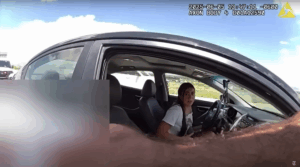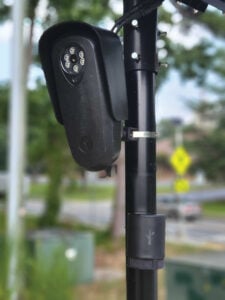
An August 12 article in the local publication The Revolutionist by Jacob Richards titled “GJPD Cameras Accessed Five Times During Goncalves Incident” discusses how local law enforcement agencies have been working with Immigration and Customs Enforcement (ICE), with a particular focus on the numbers and types of surveillance cameras local law enforcement agencies are currently using in our area, how these different types of cameras work, how they are being used and how the information they gather can be abused. For the article, Richards submitted a Colorado Open Records Act (CORA) Request for information about Mesa County Sheriff’s Deputy Alexander Zwinck’s controversial traffic stop (pdf) of Caroline Dias Goncalves and reviewed 7 hours of audio recordings and 81 pages of documents he received as a result of that request. Zwinck pulled Goncalves over on I-70 for following too closely, but then funneled information about her to ICE agents in violation of Colorado law.
Richards draws a distinction between the different types of surveillance cameras local law enforcement currently uses, like red light cameras and speeding cameras, versus automatic license plate readers (ALPRs), and in particular Flock ALPRs.
Red light cameras and speeding cameras don’t turn on until a violation has already occurred, like after someone has already blown through a red light or is driving over the speed limit. By contrast, ALPRs are on 100% of the time, tracking all of us in real time. ALPRs can log every single license plate that goes through an intersection, and are increasingly feeding this and additional information into massive AI-generated databases. In particular, Flock mass license plate readers collect more detailed information that allows law enforcement to create “vehicle finger prints,” meaning they can identify and associate a host of miscellaneous characteristics on vehicles, like dents, missing hubcaps and bumper stickers, to the point where law enforcement agencies can query the Flock database for specific bumperstickers.
Massive databases with information on everyone

In 2020, the Grand Junction Police Department (GJPD) had 26 ALPR cameras. In 2019, these cameras captured a total of 4,860,761 license plates. “So it’s not just criminals, it’s not just immigrants, it’s all of us,” Richards points out.
Currently the GJPD has 250 surveillance cameras in use, of which 30 are ALPRs.
While such databases are clearly useful in solving serious crimes committed against victims, like stolen vehicles, hit-and-runs, Amber alerts and kidnappings, Richards points out that immigration violations are civil, and not criminal violations, and should be treated on par with misdemeanors like a traffic ticket or petty shoplifting. Richards also hones in on far more troubling examples of how such databases have already been abused. In one example, a member of Texas law enforcement accessed ALPR data out of Illinois to try to prove a woman had left Texas to get an abortion. (In 2021, Texas enacted a law that created a “bounty hunter” system that rewards individuals with $10,000 if they successfully report and sue a woman who leaves the state to get an abortion. Some Texas cities and counties also now have ordinances that prohibit using local roads to transport people out of the state for an abortion.) In Sedgwick, Kansas in 2024 a police chief accessed an ALRP database 228 times over 4 months to surveil the movements of his ex-girlfriend and her new boyfriend. In the same jurisdiction, a police lieutenant used Wichita police’s ALPR cameras to stalk his estranged wife.
Troubling implications

Aside from illegal use of these databases by law enforcement authorities in positions of trust, another implication is that as Trump continues rapidly changing the U.S. from a democracy into an authoritarian state, these cameras and databases can provide the federal government and select private-sector businesses with unprecedented mass surveillance, reach and control over virtually everyone in the country who owns or drives a vehicle. All this is occurring as Trump and Republicans are pumping tens of billions of dollars into ICE, which Trump’s federal government is currently using as an aggressive, unaccountable, masked and often inhumane police force that routinely ignores people’s civil rights, including rights to due process, legal representation, and the presumption of innocence until proven guilty.
There is much more information in Richards’ article. It’s well worth a read, and a recent radio interview with Richards about these findings and more is fascinating.
You can see the Sheriff Department’s body camera footage of Goncalves’ illegal arrest here (Youtube video) and hear more about technology and local law enforcement in the age of Trumpian authoritarianism by listening to Robyn Parker’s informative KWSI Radio interview with Jacob Richards about the results of his CORA request here.

Under the Supremacy Clause (Article VI, Paragraph 2 of the U.S. Constitution), federal law takes precedence over conflicting state law. When a state law directly contradicts valid federal law, it’s invalid—period. This principle, called preemption, exists to maintain consistency and prevent states from undermining federal authority.
“State law bars government employees, including law enforcement officers, from sharing information for the purposes of “investigating for, participating in, cooperating with, or assisting in federal immigration enforcement.” This is the current law, plain and simple. Attorney General Philip Weiser has sued Mesa County Sherifs Office for not upholding the law in the recent incident with 19-year-old Caroline Dias Goncalves who was targeted by MCSO deputy Alexander Zwinck for ICE arrest. According to the editorial, the AG has said it took the action to establish enforceability of the laws on the books and to vindicate the legislature’s intent in passing them. All within the scope and role of the Attorney General.
So our County Commissioners have made the decision to counter sue (with our tax money of course), and we are also asking WHY? The accusation of political theater is pure projection, a Trump tactic we constantly see. Our County Commissioners have decided to publicly grand stand and are under the illusion that we the public supports this. Well we do not, the relentless erosion of laws and human rights that is occurring is alarming and they are simply pandering to the GOP administration and their conviction to cruelty and lawlessness.
Well said. Thank you.
I also want to add that according to recent reporting in VailDaily.com and Aspen Times, Western Colorado sheriffs are complaining that new gun control laws will strain resources. Seems there’s a problem when carrying out the will of Colorado voters, but no issue in carrying out Trump’s agenda. And the irresponsibility of the county commissioners with this frivolous lawsuit, when our local law enforcement apparently needs more funding.
So should I be able to have the SO give me all the photos showing my license number? Does that require a FOIA request?
Can we also find out who they are sharing this info with? Car repair companies? Political fund raisers? who else?
Hi Lee. Interesting question. It’s free to submit a CORA request for this information to the MCSO. If there is an excessive amount of data, they can charge you for it but they will let you know the approximate cost to get it and you can either narrow the focus of or decline the search. You can let them know up front that you approve X number of dollars in the event the request returns a lot of data. Here’s a template to use for a CORA request: https://coloradofoic.org/wp-content/uploads/2019/03/ColoRecordsRequestTemplate.pdf